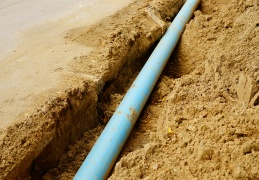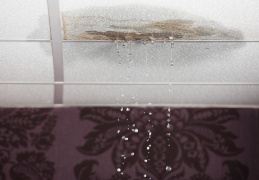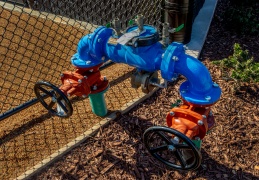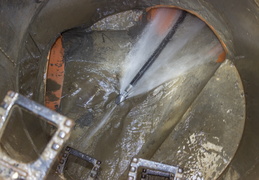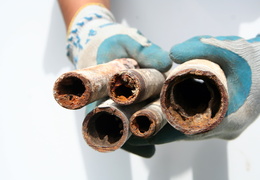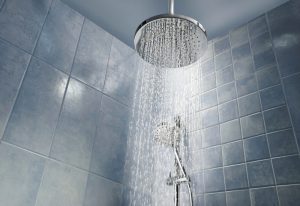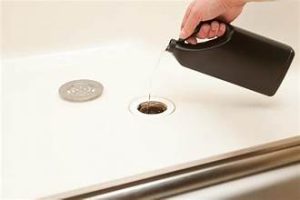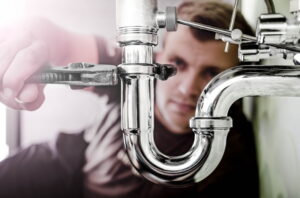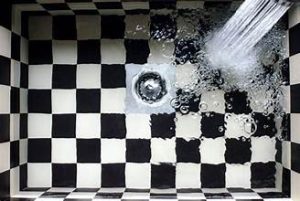When it comes to keeping your home running smoothly, your sewer line is one of those critical systems you don’t often think about—until something goes wrong. If you’re noticing persistent plumbing issues, it might be time to consider a sewer line upgrade. Our team at HM Plumbing wants to help you spot the signs before minor problems turn into costly repairs. If you’ve been putting off maintenance, now’s the time to act—our experts are here to help with professional sewer line installation in Atlanta. Regular inspections can catch small issues early, saving you time and money in the long run. Ignoring the warning signs could lead to emergency repairs that disrupt your home and budget.
Signs You Need a Sewer Line Upgrade
August 11th, 2025How Water Leak Problems Can Damage Your Home
July 28th, 2025When it comes to protecting your home, water damage is one of the most costly and stressful issues you can face. From small drips to major pipe bursts, water leaks often go unnoticed until the damage becomes obvious and expensive. That’s why timely water leak detection and repair in Atlanta is essential for preventing long-term issues.
At HM Plumbing, we’ve seen firsthand how a simple leak can lead to serious home damage if left unchecked. While it might be tempting to ignore that small water stain or occasional dripping sound, here’s what can happen when a leak is allowed to linger:
How to Prevent Common Plumbing Issues in Your Business
July 14th, 2025When you’re running a business, the last thing you want is a plumbing emergency that interrupts your operations or turns off your customers. Whether it’s a clogged drain, leaking pipes, or a sudden loss of water pressure, plumbing problems can be costly and frustrating. That’s why we always recommend being proactive. If you’re looking for reliable commercial plumbing in Atlanta, you’re already taking the first step in the right direction.
At HM Plumbing, we understand how important it is to keep your plumbing system working smoothly. Let’s go over a few smart, simple ways to avoid common plumbing issues in your business.
How Hydro Jetting Can Fix Your Clogged Drains Fast
June 16th, 2025If your drains are backing up or slow to empty, you could be dealing with more than just a minor clog. Over time, grease, soap scum, sludge, and even tree roots can build up inside your pipes, leading to serious blockages that traditional drain cleaning methods just can’t handle. That’s where hydro jetting in Atlanta comes in—a powerful, effective solution for tough clogs and long-term drain health.
Corrosion, Rust, and Age: What They Mean for Your Plumbing
June 2nd, 2025At HM Plumbing, we understand how important it is to feel confident about the systems behind your walls. Whether you’re dealing with a small leak or planning a full remodel, knowing the condition of your pipes is critical, and three key factors can’t be ignored: corrosion, rust, and age. These silent forces can turn a solid plumbing system into a ticking time bomb.
If you’re concerned about plumbing in your Atlanta home, you’re not alone—and you’re in the right place. Over time, even robust plumbing systems can silently deteriorate without obvious warning signs. That’s why it’s essential to stay proactive before small issues become major headaches.
Water Heater History: The Untold Story of Hot Showers
May 19th, 2025At HM Plumbing, we believe every hot shower you take has a story behind it—a story of ingenuity, evolution, and a surprising journey through time. You might not think twice when you turn the knob and enjoy a stream of warm water, but the history of the water heater is a tale worth telling. It’s one of those everyday comforts we’ve come to expect, but few people know how it all began.
The Dirty Truth About Drain Chemicals
May 5th, 2025When a stubborn clog slows down your kitchen sink or shower drain, it’s tempting to reach for a bottle of powerful drain cleaner. After all, they promise a fast, easy solution—just pour, wait, and rinse. The shelves are full of options that seem like miracle fixes, but the reality behind those bottles is far from harmless. But what most homeowners don’t realize is that those drain chemicals come with some serious risks that can do more harm than good.
A Beginner’s Guide to Residential Plumbing
April 21st, 2025Residential plumbing might seem overwhelming at first, but understanding the basics can save you time, money, and stress. Whether you’re a new homeowner or simply looking to become more informed, this beginner’s guide will walk you through the essential components of your home’s plumbing system and what you can do to keep it running smoothly. From fixing common issues to knowing when to call in the pros, a little plumbing knowledge can go a long way. With the right approach, you can protect your home, avoid water damage, and maintain a healthier, more efficient household.
Why Do Your Drains Back Up When It Rains?
April 7th, 2025Heavy rainfall can be a welcome break from the heat, but it’s not so pleasant when your drains start backing up. For many homeowners, stormy weather often brings with it the unpleasant surprise of slow drains, standing water, or even sewage backups. Understanding why this happens is the first step toward protecting your home—and your peace of mind.
Is Your Water Heater Making Weird Noises? What to Do
March 24th, 2025A noisy water heater is more than just an annoyance—it can be a sign that something’s not quite right. Whether it’s banging, popping, or hissing, strange sounds coming from your water heater shouldn’t be ignored. In many cases, these noises are early warnings of issues that can affect your unit’s efficiency or even shorten its lifespan. Understanding what these sounds mean and what steps to take can help you avoid bigger problems down the line.

